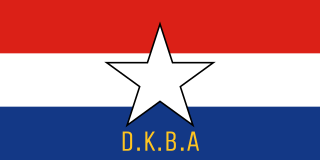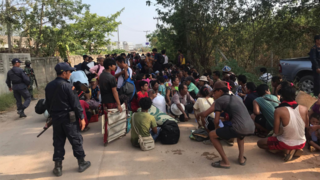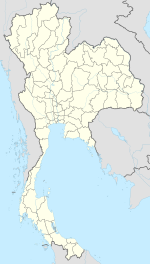
The Karen National Union is a political organisation with an armed wing, the Karen National Liberation Army (KNLA), that claims to represent the Karen people of Myanmar. It operates in mountainous eastern Myanmar and has underground networks in other areas of Myanmar where Karen people live as a minority group.

The Karen, also known as the Kayin, Kariang or Kawthoolese, are an ethnolinguistic group of Tibeto-Burman language-speaking people. The group as a whole is heterogeneous and disparate as many Karen ethnic groups do not associate or identify with each other culturally or linguistically. These Karen groups reside primarily in Kayin State, southern and southeastern Myanmar. The Karen account for around 6.69% of the Burmese population. Many Karen have migrated to Thailand, having settled mostly on the Myanmar–Thailand border. A few Karen have settled in the Andaman and Nicobar Islands, India, and other Southeast Asian and East Asian countries.

The Karenni States, also known as Red Karen States, was the name formerly given to the states inhabited mainly by the Red Karen, in the area of present-day Kayah State, eastern Burma. They were located south of the Federated Shan States and east of British Burma.

The Karen National Liberation Army is the military branch of the Karen National Union (KNU), which campaigns for the self-determination of the Karen people of Myanmar. The KNLA has been fighting the Burmese government since 1960s as part of the Karen conflict, which has been ongoing since 1949.

Insurgencies have been ongoing in Myanmar since 1948, when the country, then known as Burma, gained independence from the United Kingdom. It has largely been an ethnic conflict, with ethnic armed groups fighting Myanmar's armed forces, the Tatmadaw, for self-determination. Despite numerous ceasefires and the creation of autonomous self-administered zones in 2008, armed groups continue to call for independence, increased autonomy, or federalisation. It is the world's longest ongoing civil war, spanning almost eight decades.

Kawkareik, also spelled as Kawkarike, is a town in Karen State, Myanmar. It is the capital of Kawkaraik District and Kawkaraik Township.
Padoh Mahn Sha Lah Phan was the secretary general of the Karen National Union (KNU), an insurgent group in Myanmar.

The Democratic Karen Buddhist Army was an insurgent group of Buddhist soldiers and officers in Myanmar that split from the predominantly Christian-led Karen National Liberation Army (KNLA), one of the largest rebel factions in Myanmar. Shortly after splitting from the KNLA in December 1994, the DKBA signed a ceasefire agreement with the government of Myanmar in exchange for military and financial assistance; provided that it supported government offensives against the KNU and its allies.

Zoya Phan is a Burmese political activist. She resides in the United Kingdom, and is the Campaign Manager of the human rights organization Burma Campaign UK. She was an outspoken critic of the Burmese government when it was under direct military rule, repeatedly calling for democratic reform in Burma, as well as economic sanctions from both the British government and the United Nations. Following political changes in the country from 2011, she has continued to campaign for international action to end ongoing human rights violations, especially regarding the use of rape and sexual violence against ethnic women by the Burmese Army.
The 2010–2012 Myanmar border clashes were a series of skirmishes between the Tatmadaw on one side, and the DKBA-5 and the Karen National Liberation Army (KNLA) on the other. The clashes erupted along the border with Thailand shortly after Myanmar's general election on 7 November 2010. An estimated 10,000 refugees have fled into nearby neighbouring Thailand to escape the violent conflict. There was concern that due to discontent with the elections, and speculations of electoral fraud, that the conflict could escalate into a civil war.

Mae La, alternatively spelled Maela, or Beh klaw, is a refugee camp in Thailand. It was established in 1984 in Tha Song Yang District, Tak Province in the Dawna Range area and houses 50,000 Karen refugees; the number continues to rise as of June 2019. Mae La is the largest refugee camp for Karen refugees in Thailand. Over 90% are the persecuted ethnic Karen. The camps are overseen and run by the Thailand Burma Border Consortium (TBBC), a union of 11 international non-governmental organizations that provide food, shelter and non food items to the Burmese refugees and displaced people.
Ceasefires in Myanmar have been heavily utilized by the Burmese government as a policy to contain ethnic rebel groups and create tentative truces. The first ceasefire was arranged by the State Law and Order Restoration Council in 1989, specifically spearheaded by Khin Nyunt, then the Chief of Military Intelligence, with the Kokang-led National Democratic Alliance Army, which had recently split from the Communist Party of Burma due to internal conflicts.

The Hatgyi Dam is a planned hydropower gravity dam to be constructed on the Salween River in southeastern Myanmar. The dam site is in Myanmar’s Karen State. The project is being funded by the Electricity Generating Authority of Thailand (EGAT), China's Sinohydro Corporation, and Myanmar's Ministry of Electric Power and International Group of Entrepreneurs (IGE). The dam is expected to produce 1,100 to 1,500 megawatts of power, the majority of which will be exported to Thailand.

The Karen conflict is an armed conflict in Kayin State, Myanmar. It is part of the wider internal conflict in Myanmar between the military government and various minority groups. Karen nationalists have been fighting for an independent state, known as Kawthoolei, since 1949. The Karen National Union (KNU) and its Karen National Liberation Army (KNLA) are the most prominent Karen rebel groups. Hundreds of thousands of civilians have been displaced by the conflict, many of whom fled to neighbouring Thailand and survive in refugee camps.

The Mon National Liberation Army is a Mon insurgent group in Myanmar (Burma). It is the armed wing of the New Mon State Party (NMSP), and has been fighting government forces since 1949, though under different names. The NMSP signed the Nationwide Ceasefire Agreement (NCA) on 15 October 2015 with several other insurgent groups and the government of Myanmar.
The Fall of Manerplaw occurred on 27 January 1995, when the village of Manerplaw was captured by the Tatmadaw and the Democratic Karen Buddhist Army (DKBA). Manerplaw was the headquarters of two armed opposition groups, the Karen National Union (KNU) and the All Burma Students' Democratic Front (ABSDF). The final military assault by the Tatmadaw, aided by positional information provided by the DKBA, was met with little resistance by the KNLA, whose leaders had ordered a tactical retreat.
The Karen–Mon conflict is a series of armed clashes between the ethnic rebel armies of the Karen and Mon peoples. The Karen National Liberation Army and the Mon National Liberation Army have clashed sporadically since 1988, mostly around the Myanmar–Thailand border at Three Pagodas Pass.

Lay Kay Kaw Myothit is a town in Myawaddy Township, Kayin State in southeastern Myanmar. Nine miles in the south of Myawaddy, it is close to the border with Thailand.
Colonel Saw Chit Thu is a Karen soldier and businessperson, sometimes identified as a warlord, who has held a leading position in armed groups in Karen State, Myanmar, including the Democratic Karen Buddhist Army (DKBA), the Border Guard Forces (BGF) and the Karen National Army (KNA). He is considered a powerful figure in the border area, and has been sanctioned by the United Kingdom for links to projects which use trafficked and forced labour in online scam farms.

The Siege of Myawaddy was a significant military engagement that occurred in early 2024, during the ongoing conflict in Myanmar. The siege took place in the town of Myawaddy, located on the eastern border with Thailand.














